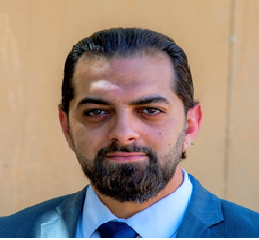9th Edition
World Heart Congress
THEME: "Heartbeat of Change: Inspiring Solutions for Global Cardiac Health"
 17-18 Nov 2025
17-18 Nov 2025  Dubai, UAE (Collaboration with the Armenian Cardiologists Association)
Dubai, UAE (Collaboration with the Armenian Cardiologists Association) THEME: "Heartbeat of Change: Inspiring Solutions for Global Cardiac Health"
 17-18 Nov 2025
17-18 Nov 2025  Dubai, UAE (Collaboration with the Armenian Cardiologists Association)
Dubai, UAE (Collaboration with the Armenian Cardiologists Association) 
Zahrawi Group, Saudi Arabia
Title: AI-Augmented Cardiovascular Diagnostics: From Image Recognition to Hemodynamic Intelligence
Moataz Aboueleid serves as the Group Division Manager for Cardiovascular (CV) at Zahrawi Group and is an active consultant to several medical device companies across the region. He plays a pivotal role in driving strategic partnerships, fostering product innovation, and supporting regional expansion initiatives across Saudi Arabia and the GCC.
With extensive expertise in cardiovascular technologies, Moataz has been instrumental in advancing the local medical device landscape, including contributions to pioneering regional manufacturing efforts such as NABD Medical Industries—one of the first cardiovascular-focused factories in Saudi Arabia.
Driven by a passion for aligning clinical needs with cutting-edge solutions, he has successfully led the commercialization of high-tech platforms, underscoring his commitment to enhancing healthcare delivery across the region.
Background:
Artificial intelligence (AI) is rapidly transforming cardiovascular diagnostics, evolving from basic image analysis to dynamic predictive modelling. Beyond conventional tools like ECG, Echo, and intravascular imaging, innovations such as computational fluid dynamics (CFD), virtual fractional flow reserve (vFFR), and non-invasive coronary flow reserve (CFR) modelling now offer functional assessments without catheter-based measurements.
Objective:
This presentation explores the application of AI in generating patient-specific hemodynamic simulations and decision-support tools in interventional cardiology. Highlighted technologies include deep learning derived vFFR from angiograms, CFD-based simulations for pre-PCI planning, and AI-powered fusion engines that integrate CTA, IVUS, and OCT into a unified diagnostic dashboard. Case studies from international centers will be shared to demonstrate clinical utility, feasibility, and workflow integration.
Conclusion:
AI-powered cardiovascular diagnostics represent a major shift from descriptive to predictive cardiology, providing real-time, physiology-based insights at the point of care. These platforms improve diagnostic precision, reduce procedural invasiveness, and support more personalized treatment planning. In high-risk and resource-constrained healthcare settings, AI is emerging as a cognitive partner in the cath lab-streamlining decision-making, enhancing patient outcomes, and enabling a more intelligent, efficient standard of care. As the field continues to evolve, such technologies hold the potential to redefine how cardiovascular disease is diagnosed, managed, and ultimately prevented.